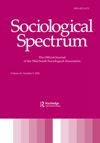Moral narratives of sobriety: a qualitative study of a lived religion framework of Alcoholics Anonymous
IF 1.1
3区 社会学
Q2 SOCIOLOGY
引用次数: 0
Abstract
AbstractThis study examines how Alcoholics Anonymous (AA) can be understood as a “lived religion” that seeks to legitimize and moralize certain experiences and beliefs through narratives that are affirmed by the substance abuse recovery community. Through a qualitative analysis of 20 in-depth interviews with both actively recovering and non-actively recovering participants of AA, we identify three distinct moral narratives described by participants related to the construction of spiritual beliefs, individual health, and social belonging that highlight how the structure of AA reifies stories of addiction recovery as morally charged. We contribute to sociology of religion and addiction studies by examining how social and spiritual systems (i.e. systems embodying our complex and multi-faceted social connections to other people and our beliefs and attitudes about powers greater than oneself) orient alcohol addiction recovery within the context of AA support groups. For sociological inquiry more broadly, we show how moral narratives have the power to shift individual understanding of social support, power and self-control, and belonging. Disclosure statementThe authors have no relevant financial or non-financial interests to disclose.Additional informationNotes on contributorsMaia C. BehrendtDr. Maia C. Behrendt is an Assistant Professor of Sociology at Saint Norbert College, De Pere, WI, USA (maia.behrendt@snc.edu).Kelsy BurkeDr. Kelsy Burke is an Associate Professor of Sociology at the University of Nebraska-Lincoln, Lincoln, NE, USA (kburke@unl.edu).清醒的道德叙事:对匿名酗酒者的生活宗教框架的定性研究
摘要本研究探讨了匿名戒酒会(AA)如何被理解为一种“活的宗教”,它试图通过药物滥用康复社区所肯定的叙述来使某些经历和信仰合法化和道德化。通过对20名积极康复和非积极康复的AA参与者的深度访谈进行定性分析,我们确定了参与者描述的三种不同的道德叙事,这些叙事与精神信仰、个人健康和社会归属感的构建有关,突出了AA的结构如何将成瘾康复的故事具体化为道德规范。我们通过研究社会和精神系统(即体现我们与其他人复杂和多方面的社会联系以及我们对比自己更强大的力量的信仰和态度的系统)如何在AA支持团体的背景下引导酒精成瘾康复,从而为宗教和成瘾研究的社会学做出贡献。对于更广泛的社会学探究,我们展示了道德叙事如何有能力改变个人对社会支持、权力和自我控制以及归属感的理解。作者没有相关的财务或非经济利益需要披露。关于贡献者的说明。Maia C. Behrendt,美国威斯康辛州De Pere圣诺伯特学院社会学助理教授(maia.behrendt@snc.edu)。Kelsy Burke是美国内布拉斯加大学林肯分校社会学副教授(kburke@unl.edu)。
本文章由计算机程序翻译,如有差异,请以英文原文为准。
求助全文
约1分钟内获得全文
求助全文
来源期刊

Sociological Spectrum
SOCIOLOGY-
CiteScore
3.80
自引率
5.60%
发文量
16
期刊介绍:
Sociological Spectrum publishes papers on theoretical, methodological, quantitative and qualitative research, and applied research in areas of sociology, social psychology, anthropology, and political science.
 求助内容:
求助内容: 应助结果提醒方式:
应助结果提醒方式:


